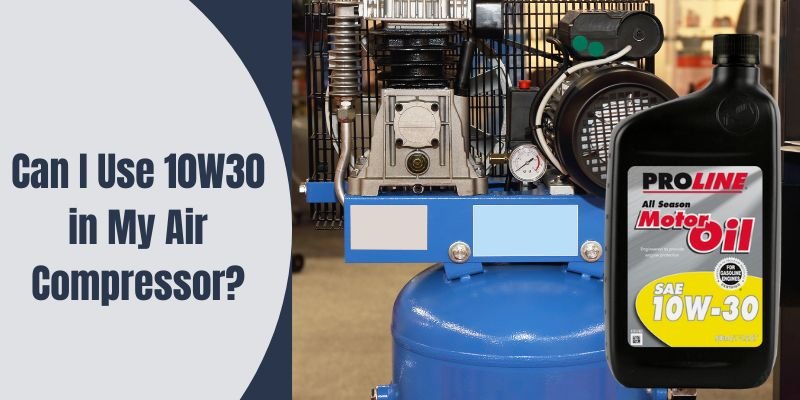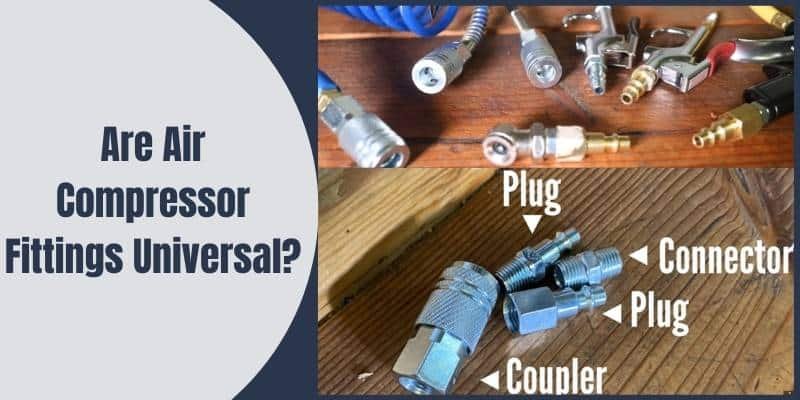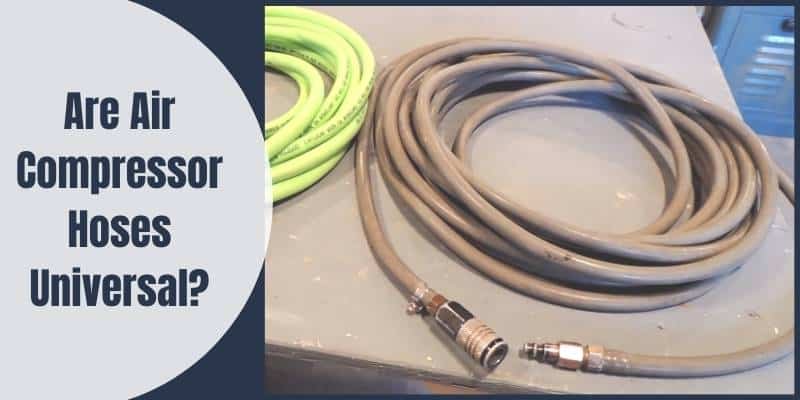Disclosure: This post contains affiliate links and I will be compensated if you make a purchase after clicking through my links. Learn More
Air compressors are essential tools in various industries and workshops, helping us power pneumatic tools, inflate tires, and perform a range of tasks. To ensure their longevity and efficiency, it’s crucial to use the right oil. One common question that arises is, “Can I use 10W30 in my air compressor?”
In this comprehensive guide, we will answer this question and provide you with expert insights, FAQs, and essential information to keep your air compressor running smoothly.

Understanding Air Compressor Oil
When it comes to air compressors, using the right type of oil is crucial for optimal performance and longevity. The oil in an air compressor not only lubricates the moving parts but also helps to cool the compressor. In this section, we will discuss the different types of air compressor oil and what to consider when choosing the right one for your compressor.
Types of Air Compressor Oil
There are three main types of air compressor oil:
- Mineral oil
- Synthetic oil
- Semi-synthetic oil.
Mineral oil is the most common type and is suitable for most compressors. Synthetic oil is more expensive but offers better performance in extreme temperatures and longer-lasting protection. Semi-synthetic oil is a blend of mineral and synthetic oil and provides a balance of affordability and performance.
Considerations for Choosing Air Compressor Oil
When choosing air compressor oil, you should consider the following factors:
- Viscosity: The viscosity of the oil determines how well it will lubricate the compressor. The viscosity rating is indicated by the numbers before the “W” in the oil’s name. For example, 10W30 means the oil has a viscosity of 10 in cold temperatures and 30 in hot temperatures.
- Additives: Some air compressor oils contain additives such as detergents, anti-wear agents, and rust inhibitors to improve performance and protect the compressor.
- Compatibility: Make sure the oil you choose is compatible with your compressor’s materials. Some oils may cause damage to certain types of seals or gaskets.
- Operating conditions: Consider the temperature and humidity levels in your compressor’s operating environment. If you operate your compressor in extreme temperatures, a synthetic oil may be a better choice.
Choosing the right air compressor oil is important for maintaining the performance and longevity of your compressor. Consider the viscosity, additives, compatibility, and operating conditions when selecting the best oil for your compressor.
Can You Use 10W30 in Your Air Compressor
The answer to whether you can use 10W30 oil in your air compressor is not a straightforward yes or no. It depends on several factors.
Firstly, you need to check the manufacturer’s recommendations for your specific air compressor model. Some manufacturers may advise against using 10W30 oil, while others may recommend it.
Secondly, you need to consider the operating temperature of your air compressor. If you live in a region with extreme temperatures, you may need to use a different oil viscosity to ensure optimal performance. In such cases, it is best to consult with a professional.
Thirdly, you need to consider the type of compressor you have. Reciprocating compressors and rotary screw compressors have different oil requirements. Using the wrong oil can damage your compressor and void your warranty.
10W30 Oil and Its Properties
When it comes to using oil in your air compressor, you might be wondering if you can use 10W30 oil. 10W30 oil is a common type of motor oil that many people use in their cars, but can it be used in an air compressor?
The answer is yes, you can use 10W30 oil in your air compressor, but there are some things you should know about this type of oil.
Here are some of the properties of 10W30 oil:
- Viscosity: 10W30 oil has a viscosity of 10 in cold temperatures and 30 in hot temperatures. This means that it is a multi-grade oil that can perform well in a range of temperatures.
- Detergents: 10W30 oil contains detergents that help to keep the engine clean by removing dirt and debris. This can help to extend the life of your air compressor by preventing buildup and corrosion.
- Additives: 10W30 oil also contains additives that help to protect the engine from wear and tear. These additives can help to extend the life of your air compressor and keep it running smoothly.
It’s important to note that not all air compressors are the same, and some may require different types of oil. Always check your owner’s manual to see what type of oil is recommended for your specific air compressor.
In summary, 10W30 oil can be used in your air compressor, but make sure to check your owner’s manual to ensure that it is the right type of oil for your compressor. With its viscosity, detergents, and additives, 10W30 oil can help to keep your air compressor running smoothly and extend its life.
Compatibility of 10W30 with Air Compressors
When it comes to choosing the right oil for your air compressor, it’s essential to know what type and viscosity of oil your compressor requires. One question that often arises is whether you can use 10W30 oil in your air compressor.
First, you need to check your compressor’s manual to see what type of oil it recommends. If it specifies 10W30 oil, then you can use it. However, if it recommends a different viscosity or type of oil, you should follow those guidelines instead.
One thing to keep in mind is that 10W30 oil is a multi-grade oil, which means it’s suitable for use in a wide range of temperatures. This makes it a popular choice for many applications, including air compressors. However, some compressor manufacturers may recommend using a single-grade oil instead.
Another factor to consider is the type of compressor you have. Reciprocating compressors, for example, require different types of oil than rotary screw compressors. Again, your compressor’s manual should provide guidance on what type of oil to use.
In summary, if your air compressor manual specifies 10W30 oil, then it’s safe to use. However, it’s always best to follow the manufacturer’s recommendations for oil type and viscosity to ensure optimal performance and longevity of your compressor.
Pros and Cons of Using 10W30 in Air Compressors
Using 10W30 oil in your air compressor can have both advantages and disadvantages. Here are some pros and cons to consider:
Pros
- Better lubrication: 10W30 oil is a multi-grade oil that provides better lubrication than single-grade oils, which can help extend the life of your compressor.
- Improved performance in low temperatures: The “10” in 10W30 indicates that it has a lower viscosity in cold temperatures, which can help your compressor start up more easily in colder weather.
- Widely available: 10W30 oil is a common type of oil that can be easily found at most auto parts stores and online retailers.
Cons
- Not suitable for high-temperature environments: 10W30 oil is not recommended for use in high-temperature environments, such as those found in industrial air compressors, as it can break down more quickly under high heat.
- May not be compatible with all compressors: Some air compressor manufacturers recommend using only specific types of oil, and using 10W30 oil may void your compressor’s warranty.
- Can be more expensive: 10W30 oil is typically more expensive than single-grade oils, which can increase your maintenance costs over time.
Overall, using 10W30 oil in your air compressor can be a good option if you’re looking for better lubrication and improved performance in colder temperatures. However, it may not be suitable for all compressors and environments, and can be more expensive than other types of oil.
Alternatives to 10W30 for Air Compressors
If you’re unable to find 10W30 oil for your air compressor, don’t worry, there are alternatives available. Here are a few options you can consider:
1. 5W30 Oil
5W30 oil is a great alternative to 10W30 oil for air compressors. It has the same viscosity rating as 10W30 oil, but it’s a thinner oil that can flow more easily through the compressor’s system. This oil is also more readily available in most auto parts stores.
2. Synthetic Oil
Synthetic oil is another alternative you can use in place of 10W30 oil. It’s a high-performance oil that can withstand higher temperatures and pressures than conventional oils. Synthetic oil also lasts longer than conventional oils, so you won’t need to change it as frequently.
3. Compressor Oil
Compressor oil is specifically designed for air compressors and is a great alternative to 10W30 oil. It’s formulated to withstand the high temperatures and pressures of air compressors and provides better lubrication than other oils. Compressor oil is available in different grades, so make sure to choose the right one for your compressor.
4. Multi-Grade Oil
Multi-grade oil is another alternative to 10W30 oil for air compressors. It’s a blend of different viscosity oils that can perform well in a wide range of temperatures. This oil can provide better lubrication than single-grade oils, but it may not be as effective as compressor oil.
In conclusion, if you’re unable to find 10W30 oil for your air compressor, there are alternatives available. Consider using 5W30 oil, synthetic oil, compressor oil, or multi-grade oil as a substitute. Make sure to choose the right oil for your compressor to ensure optimal performance and longevity.
Maintenance Tips for Air Compressors Using 10W30
If you’re using 10W30 oil in your air compressor, there are a few maintenance tips you should keep in mind to ensure that your compressor is running smoothly and efficiently.
- Check the oil level regularly: It’s important to check the oil level in your compressor on a regular basis to ensure that it’s not running low. Low oil levels can cause damage to your compressor’s internal components, so it’s important to keep the oil level topped up.
- Change the oil regularly: Regular oil changes are essential for maintaining the health of your compressor. Make sure to follow the manufacturer’s recommendations for oil change intervals, and always use high-quality oil.
- Monitor the air filter: The air filter in your compressor helps to keep dust and debris out of the system, which can cause damage over time. Make sure to inspect the air filter regularly and replace it as needed.
- Keep the compressor clean: Dirt and debris can accumulate on your compressor over time, which can cause it to run less efficiently. Make sure to keep the compressor clean and free of debris to ensure that it’s running at peak performance.
- Inspect the belts and hoses: Belts and hoses can wear out over time, which can cause your compressor to run less efficiently. Make sure to inspect the belts and hoses on a regular basis and replace them as needed.
By following these maintenance tips, you can ensure that your air compressor is running smoothly and efficiently, and that it will continue to do so for years to come.
Expert Opinions on Using 10W30 in Air Compressors
When it comes to using 10W30 oil in your air compressor, there are varying opinions from experts in the field. Here are a few perspectives to consider:
- Compressor Manufacturers: Many compressor manufacturers recommend specific types of oil for their products. Some may recommend 10W30, while others may suggest a different viscosity or type of oil altogether. It’s important to follow the manufacturer’s recommendations to ensure optimal performance and longevity of your compressor.
- Oil Manufacturers: Oil manufacturers may also have recommendations for which type of oil to use in air compressors. Some may have specific blends or formulations that are designed for use in compressors, while others may suggest a more general-purpose oil like 10W30. It’s important to research and choose a reputable oil manufacturer to ensure the quality of the oil you’re using.
- Mechanics and Technicians: Mechanics and technicians who work with air compressors may have their own opinions on using 10W30 oil. Some may recommend it for certain types of compressors or applications, while others may suggest a different type of oil. It’s important to seek out advice from experienced professionals who have worked with a variety of compressors and oils.
Overall, while 10W30 oil may be suitable for use in some air compressors, it’s important to consider the recommendations of the manufacturer, oil manufacturer, and experienced professionals. Choosing the right oil can help ensure optimal performance and longevity of your air compressor.
FAQs about Using 10W30 in Air Compressors
If you’re considering using 10W30 oil in your air compressor, you’re not alone. Many people wonder if this type of oil is suitable for use in an air compressor. Here are some common questions and answers about using 10W30 in air compressors:
What are the benefits of using 10W30 oil in an air compressor?
10W30 oil is a multi-grade oil that provides good protection against wear and tear. It also offers excellent viscosity control and thermal stability, making it a good choice for use in air compressors that operate in a wide range of temperatures.
Are there any drawbacks to using 10W30 oil in an air compressor?
One potential drawback of using 10W30 oil in an air compressor is that it may not provide adequate lubrication in extreme temperatures. If you live in an area with very high or very low temperatures, you may want to consider using a different type of oil.
How often should I change the oil in my air compressor if I’m using 10W30 oil?
You should change the oil in your air compressor according to the manufacturer’s recommendations, regardless of the type of oil you’re using. However, if you’re using 10W30 oil, you may need to change it more frequently than if you were using a different type of oil. Check your compressor’s manual for specific recommendations.
Is it safe to use 10W30 oil in my air compressor?
Yes, it can be safe to use 10W30 oil in your air compressor, but it depends on your compressor’s specifications and the factors mentioned earlier. Always consult your compressor’s manual or the manufacturer for guidance.
What happens if I use the wrong oil?
Using the wrong oil can lead to increased wear and tear, reduced efficiency, and potential damage to your air compressor’s components. It’s essential to use the recommended oil to ensure optimal performance.
Can I mix different types of oil in my air compressor?
It’s generally not recommended to mix different types of oil in your air compressor, as it can lead to unpredictable results. Stick to the oil type recommended by the manufacturer.
How often should I change the oil in my air compressor?
The frequency of oil changes depends on factors such as usage, operating conditions, and the type of oil used. Refer to your compressor’s manual for guidance on oil change intervals.
Can I use synthetic 10W30 oil in my air compressor?
Using synthetic 10W30 oil can be a good choice for some air compressors, as it offers improved performance and stability in extreme temperatures. However, always check your compressor’s compatibility before making the switch.
Where can I find the recommended oil type for my air compressor?
You can typically find the recommended oil type for your air compressor in the owner’s manual or on the manufacturer’s website. If you’re unsure, don’t hesitate to contact the manufacturer directly for guidance.
Conclusion
In conclusion, the question, “Can I use 10W30 in my air compressor?” requires careful consideration of various factors. While it can be suitable for some air compressors, it may not be the best choice for others. To ensure optimal performance, longevity, and safety for your air compressor, always consult the manufacturer’s recommendations and take into account the specific conditions in which you’ll be operating your compressor.
Choosing the right oil is a crucial step in maintaining your air compressor, and it’s worth investing the time to make an informed decision.
By doing so, you’ll ensure that your air compressor operates at its best and serves you well for years to come.








